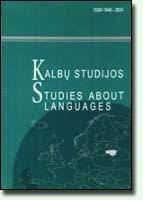Analysis of Political Discourse: Methodological Constraints
Analysis of Political Discourse: Methodological Constraints
Author(s): Piotr CapSubject(s): Pragmatics, Psycholinguistics, Sociolinguistics, Social psychology and group interaction, Evaluation research
Published by: Kauno Technologijos Universitetas
Keywords: Political discourse; pragmatics; psycholinguistics; social psychology;
Summary/Abstract: The paper bridges considerations characteristic of the domains of linguistic pragmatics, discourse analysis, as well as psycholinguistics and social psychology. It poses the hypothesis that political discourse is as such an analytic determinant, i.e. that it dictates methods of investigation into it. These methods manifest a “bottom-up” or “top-down” orientation (cf. Beaugrande, 1991), which is different in intensity relative to what kind of text is investigated. It is argued that certain texts which “include” an analyst (i.e. where an analyst is part of depicted events or part of discourse audience) or are more “familiar” to him/her generate observations on their function and structure at an early stage of their componential analysis, or even before it takes place. Once the global function of the text has been presupposed, the analysis proceeds “top-down”, i.e. toward all micro-data chunks supportive of the initial hypothesis.
Journal: Kalbų Studijos
- Issue Year: 2002
- Issue No: 2
- Page Range: 46-51
- Page Count: 6
- Language: English

